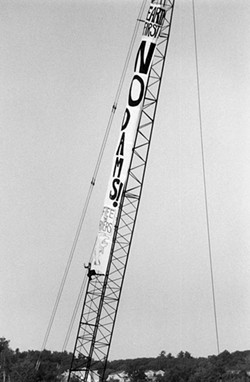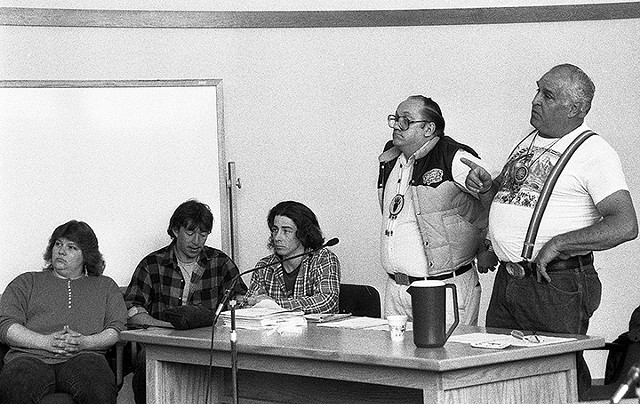Former Vermont Photojournalist Releases Earth Day Photo Essay of Ecological Struggles for Justice

- Photo courtesy of Orin Langelle
- A climber on crane protests the construction of a hydroelectric dam on the Winooski River in solidarity with Vermont's Abenaki tribe. (1992)
Langelle, a former Hinesburg photographer and social activist, was profiled by Seven Days' Mike Ives in a February 20, 2008 story, "Shutterbuggin'." He released the photo essay in honor of Earth Day 2014.
Langelle, 63, got his start in photojournalism in 1972 with an assignment to cover street protests outside the Republican National Convention in Miami Beach, Fla. Throughout the ’80s, he documented various ecological fights around the world. Then, in 1991, he cofounded the international Native Forest Network (NFN) in Tasmania, Australia, and ran its Eastern North American Resource Center in Burlington.
As Langelle told Ives back in 2008 with his characteristic bluntness, while he can certainly enjoy a well-composed nature photo, "I can also look at a beautiful Ansel Adams photograph and ask, ‘Where the fuck is the beer can?’ Because things usually aren’t that clean anymore.”
Langelle points out in a written statement accompanying his work that many of the campaigns he documented over the years had successful outcomes. They include the global campaign to stop the killing of dolphins by industrial tuna fishing and campaigns aimed at the rescinding of the death warrant for political prisoner Mumia Abu-Jamal, a moratorium on the aerial spraying of toxic herbicides on Vermont forests, the permanent cessation of all logging on Illinois state forests, and the end of construction of hydroelectric dams on Cree territory near James Bay, Québec.
Other photos that may be of particular interest to Vermonters are those involving the Abenaki's struggle for state recognition in the 1990s (below). Langelle’s support for the Abenaki in the early 1990s, documented in this latest photo essay, led to his adoption as an honorary member of the Saint Francis-Sokoki band of the Abenaki in 1992.

- Photo courtesy of Orin Langelle
- Abenaki Chief Homer St. Francis (right), points finger at the judge who presided over court cases against Abenaki for their refusal to recognize the state of Vermont or the U.S. The judge told St. Francis that he was out of order and the chief replied, “No judge, you’re out of order.” (1991)
Langelle, who spent more than two decades in Vermont before relocating to western New York state two years ago, has largely stepped aside from doing direct-action campaigns. He says he still gets out there once in a while to shoot images when the time is right and the need is there. And, as always, he makes no apologies for photographs that have a distinct point of view, both artistically and philosophically.
"I take my responsibility as a concerned photographer very seriously," he says. "The myth of objective journalism, where the truth must be counterbalanced by the untruth, has no place in a just society, especially when corporate propaganda already dominates so much of the media."
View the photo essay here.
Speaking of...
-

Fighting Between Québécois and Vermont Abenaki Tribes Puts Conservation Groups in a Bind
Dec 13, 2023 -

Turning Trash Into Art for an Earth Day Lesson
Apr 26, 2023 -

Ben Cohen’s Cannabis Company Tries to Undo the Harm of the War on Drugs
Apr 19, 2023 -

A Burlington Chef with Abenaki Heritage Makes His Own Harvest Meal
Nov 22, 2022 -

Cabot Opens Its Town Forest to Abenaki People for Foraging
May 18, 2022 - More »





Comments
Showing 1-1 of 1
Comments are closed.
From 2014-2020, Seven Days allowed readers to comment on all stories posted on our website. While we've appreciated the suggestions and insights, right now Seven Days is prioritizing our core mission — producing high-quality, responsible local journalism — over moderating online debates between readers.
To criticize, correct or praise our reporting, please send us a letter to the editor or send us a tip. We’ll check it out and report the results.
Online comments may return when we have better tech tools for managing them. Thanks for reading.